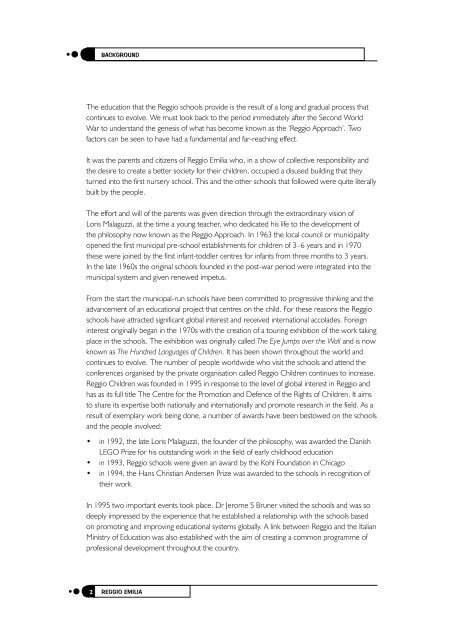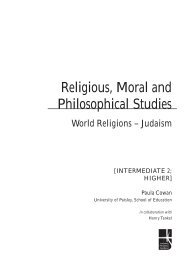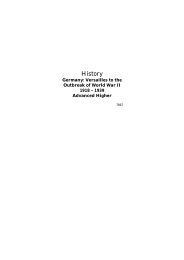The Reggio Emilia Approach to Early Years - Education Scotland
The Reggio Emilia Approach to Early Years - Education Scotland
The Reggio Emilia Approach to Early Years - Education Scotland
Create successful ePaper yourself
Turn your PDF publications into a flip-book with our unique Google optimized e-Paper software.
BACKGROUND<br />
<strong>The</strong> education that the <strong>Reggio</strong> schools provide is the result of a long and gradual process that<br />
continues <strong>to</strong> evolve. We must look back <strong>to</strong> the period immediately after the Second World<br />
War <strong>to</strong> understand the genesis of what has become known as the ‘<strong>Reggio</strong> <strong>Approach</strong>’. Two<br />
fac<strong>to</strong>rs can be seen <strong>to</strong> have had a fundamental and far-reaching effect.<br />
It was the parents and citizens of <strong>Reggio</strong> <strong>Emilia</strong> who, in a show of collective responsibility and<br />
the desire <strong>to</strong> create a better society for their children, occupied a disused building that they<br />
turned in<strong>to</strong> the first nursery school. This and the other schools that followed were quite literally<br />
built by the people.<br />
<strong>The</strong> effort and will of the parents was given direction through the extraordinary vision of<br />
Loris Malaguzzi, at the time a young teacher, who dedicated his life <strong>to</strong> the development of<br />
the philosophy now known as the <strong>Reggio</strong> <strong>Approach</strong>. In 1963 the local council or municipality<br />
opened the first municipal pre-school establishments for children of 3–6 years and in 1970<br />
these were joined by the first infant-<strong>to</strong>ddler centres for infants from three months <strong>to</strong> 3 years.<br />
In the late 1960s the original schools founded in the post-war period were integrated in<strong>to</strong> the<br />
municipal system and given renewed impetus.<br />
From the start the municipal-run schools have been committed <strong>to</strong> progressive thinking and the<br />
advancement of an educational project that centres on the child. For these reasons the <strong>Reggio</strong><br />
schools have attracted significant global interest and received international accolades. Foreign<br />
interest originally began in the 1970s with the creation of a <strong>to</strong>uring exhibition of the work taking<br />
place in the schools. <strong>The</strong> exhibition was originally called <strong>The</strong> Eye Jumps over the Wall and is now<br />
known as <strong>The</strong> Hundred Languages of Children. It has been shown throughout the world and<br />
continues <strong>to</strong> evolve. <strong>The</strong> number of people worldwide who visit the schools and attend the<br />
conferences organised by the private organisation called <strong>Reggio</strong> Children continues <strong>to</strong> increase.<br />
<strong>Reggio</strong> Children was founded in 1995 in response <strong>to</strong> the level of global interest in <strong>Reggio</strong> and<br />
has as its full title <strong>The</strong> Centre for the Promotion and Defence of the Rights of Children. It aims<br />
<strong>to</strong> share its expertise both nationally and internationally and promote research in the field. As a<br />
result of exemplary work being done, a number of awards have been bes<strong>to</strong>wed on the schools<br />
and the people involved:<br />
• in 1992, the late Loris Malaguzzi, the founder of the philosophy, was awarded the Danish<br />
LEGO Prize for his outstanding work in the field of early childhood education<br />
• in 1993, <strong>Reggio</strong> schools were given an award by the Kohl Foundation in Chicago<br />
• in 1994, the Hans Christian Andersen Prize was awarded <strong>to</strong> the schools in recognition of<br />
their work.<br />
In 1995 two important events <strong>to</strong>ok place. Dr Jerome S Bruner visited the schools and was so<br />
deeply impressed by the experience that he established a relationship with the schools based<br />
on promoting and improving educational systems globally. A link between <strong>Reggio</strong> and the Italian<br />
Ministry of <strong>Education</strong> was also established with the aim of creating a common programme of<br />
professional development throughout the country.<br />
REGGIO EMILIA

















